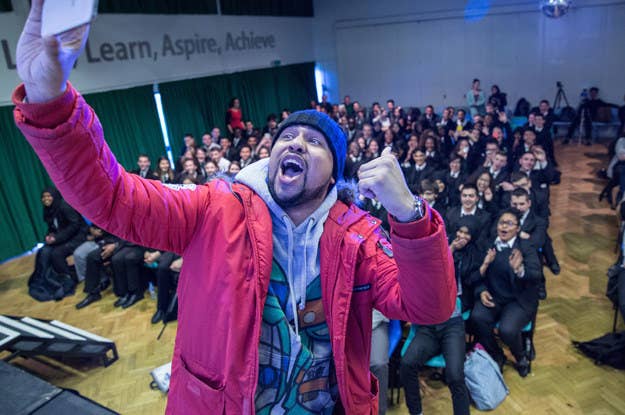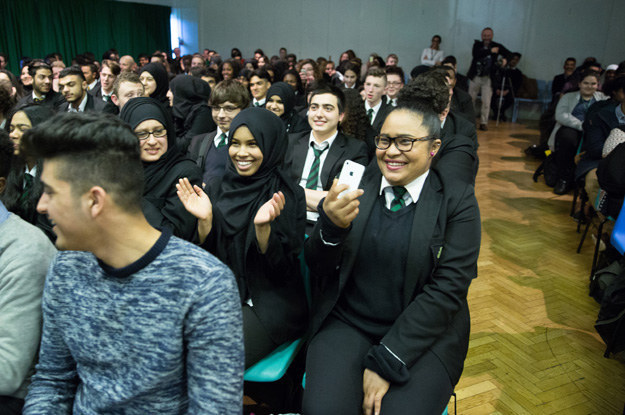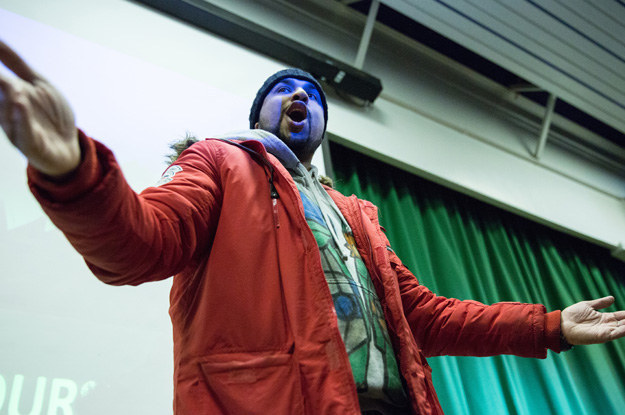LONDON – For the students at Aylwood Academy, north London, today's assembly is more exciting than usual. "I can't believe he's coming here!" one pupil shouts. Meanwhile, a group of girls all donning Hijabs (headscarves) make no secret of their swooning; "He's peng, you know" one says. It immediately results in a fit of giggling.
The assembly begins with a short presentation by a police officer, who's highlighting the dangers of extremist views, and how to spot them – particularly on the internet.
But halfway through, a man wearing low-slung jeans, a black beanie hat and sporting a perfectly trimmed beard enters through the back door – and is immediately met by excited screams and clapping.
"What's happenin' guys!" the man says, in a playful south London accent. "Shall we take some selfies?"

Humza Arshad has become a household name among many British Muslims as a result of his hit YouTube comedy show, "Diary of a Badman".
His creation is a unique brand of situational comedy focused on the everyday problems of young British Muslims – ranging from embarrassing uncles, to week-old dhaal (lentil curry) to the troubles that come with Asian parenting.
"'Diary of a Badman' is about a young British Pakistani Muslim thinking he's a gangster, but he's not," Arshad told BuzzFeed News.
"He's got no girls, always gets beaten up by his mum and always finds himself getting into ridiculous situations that he somehow gets out of. But at the end of every episode, there's always a positive message – whether that's from the Qur'an, or just a universal lesson."
Since the show began broadcasting from Arshad's bedroom, it has racked up more than 62 million views and has taken Arshad all over the world.
But now, Arshad is using his fame for a more noble purpose – to steer vulnerable young Muslims away from extremism.
Along with London's Metropolitan Police, he's spent the past month touring inner city schools. Using comedy, he's attempting to reach out to some of the city's most underprivileged and disaffected young people – many of whom are Muslim, and could be susceptible to extremism.
Throughout the show, Arshad pokes fun of the anti-Islamic headlines that appear on many British newspapers (one joke about an "Evil Muslim dog attacking grass" goes down particularly well). Other students are quick to remind him of his lack of a girlfriend (a constant ailment of Arshad's character) as well as the terrible haircut he conceals under his cap.
However, his main message is to urge students to be careful about what they read and see online, particularly about Islam.
He says that despite its supporters' claims, "ISIS and these other extremist groups – they aren't following Islam properly. Islam teaches us to love, not to commit violent acts."
It's a message that the overwhelming majority of students nod their heads to – some even applaud him.
As part of his tour, he also shows a special episode which explores the issue of extremism within some British Muslim communities.
View this video on YouTube
The episode sees his cousin slowly becoming influenced by radical preachers and online videos– before coming to his senses.
For Arshad, this initiative isn't just for charity – it's personal too.
Just a few weeks before the visit, three girls from Bethnal Green left their school and fled to Syria, including one whose family he knew personally.
"I was so shocked," Arshad told BuzzFeed News. "They were just a normal family, a very nice family, so I was just completely shocked."
When he brings the subject up during the show, some of the students say how shocked they were then they heard the news. "They were my age!," one student tells Arshad. Others tell him how they might have "met the wrong people" on social media, who could have been responsible for radicalising them.
Arshad says the incident shows how susceptible young Muslims are to extremist narratives on the internet.
"How many of you have got Facebook?" Arshad asks. The majority of students raise their hands. "It's not just for linking, you know!"
"What [extremists] do is groom girls on Facebook, they make out that they're religious because they have a beard down to their bellybuttons!" he tells the students, who immediately erupt in laughter.
"And then they get married to a terrorist with dry ankles! They don't even have any E45 in Syria, man!"
After the show, Arshad told BuzzFeed News that he uses jokes to break down barriers surrounding the issue of extremism in Muslim communities.
"What I try to do is to get the audiences attention through comedy, and I don't want to be preachy," he says. "I wanted to let them enjoy it and then take away the positive message after."
He adds that while police officers, community centres and imams have done a good job in highlighting the dangers of radicalisation, that there are still a "huge number" of Muslims who are feeling isolated by society.

It's for that reason that Arshad believes comedy is a powerful tool to reach out to disaffected Muslim youth: "It's one way of talking about it that works," he insists.
"[Extremism] is a very sensitive issue and comedy breaks barriers; you'll have fun and be more accepting about learning positive messages."
Arshad believes the programme has produced positive results so far – citing one case where his show helped a young Muslim man who had expressed some sympathy for extremist groups.
"He was just very angry," Arshad says. "A lot of young people, when they're angry, they can be manipulated easily."
While he admits that it won't be enough to deter all young people from extremism, he adds that the perception of anti-Islamic sentiment in the media also play a strong role in the radicalisation process.
"The media nowadays have a negative outlook on Islam – it's always in the news, terrorist this, terrorist that. It gives a false stereotype about who Muslims are," he says.
"Many Muslims feel upset and bullied – it creates a 'them-against-us' division, which can stir things up."
"However," he adds, "a lot of Muslims want to work with the community, we're just normal people who want our communities to be safe.
"It's a few misguided individuals that give Muslims a bad name. In the general public, we all want the same thing – and mosques, imams have been stepping up to do community outreach."

While the Metropolitan Police declined to make an official comment to BuzzFeed News, one officer at the event said the programme was reaching out to young Muslims in a way that British authorities had been struggling with.
The officer added that while there were numerous anti-radicalisation initiatives happening across the UK, this initiative was proving so successful that the authorities are considering taking it nationwide.
Arshad believes the key to his success is an understanding of British Asian culture.
"Let's say they got an officer to come in – they wouldn't know how to talk about Islam in a way kids could relate to," he says.
"The kids watch my videos and get excited – so there is that relationship, that connection which allows the message to be spread more easily."
That message seems to have resonated among most of the students Arshad has spoken to today.
While most ask questions about the show itself (especially his violent mum), some ask about his rise to fame, and how and whether they can pursue a career in industries where there are still a lack of Muslim representation.
While he admits he's lucky to have enjoyed so much success, he encourages them to pursue creative ways to express themselves and their identities.
Of course, there are others who are more critical of Arshad. One student asks him: "You used to be funny, what happened?"
There's a brief awkward silence.
"Well here's the thing," Arshad says, as he addresses the room. "Just look at the state of this boy's hair!"


